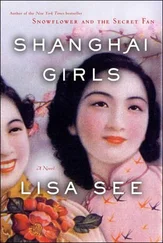Lisa See - Peony in Love
Здесь есть возможность читать онлайн «Lisa See - Peony in Love» весь текст электронной книги совершенно бесплатно (целиком полную версию без сокращений). В некоторых случаях можно слушать аудио, скачать через торрент в формате fb2 и присутствует краткое содержание. Жанр: Старинная литература, на английском языке. Описание произведения, (предисловие) а так же отзывы посетителей доступны на портале библиотеки ЛибКат.
- Название:Peony in Love
- Автор:
- Жанр:
- Год:неизвестен
- ISBN:нет данных
- Рейтинг книги:4 / 5. Голосов: 1
-
Избранное:Добавить в избранное
- Отзывы:
-
Ваша оценка:
- 80
- 1
- 2
- 3
- 4
- 5
Peony in Love: краткое содержание, описание и аннотация
Предлагаем к чтению аннотацию, описание, краткое содержание или предисловие (зависит от того, что написал сам автор книги «Peony in Love»). Если вы не нашли необходимую информацию о книге — напишите в комментариях, мы постараемся отыскать её.
Peony in Love — читать онлайн бесплатно полную книгу (весь текст) целиком
Ниже представлен текст книги, разбитый по страницам. Система сохранения места последней прочитанной страницы, позволяет с удобством читать онлайн бесплатно книгу «Peony in Love», без необходимости каждый раз заново искать на чём Вы остановились. Поставьте закладку, и сможете в любой момент перейти на страницу, на которой закончили чтение.
Интервал:
Закладка:
As Mengmei recovered at the shrine, he grew restless and strolled through the gardens. Quite by accident—except that it had to be fate interfering—he found the box with Liniang’s rolled-up self-portrait scroll.
He believed he’d found a painting of the goddess Guanyin. He took the scroll back to his room and burned incense before it. He delighted in Guanyin’s soft mist of hair, her tiny mouth shaped like a rosebud, and the way love’s longing seemed to be locked between her brows, but the closer he looked, the more convinced he became that the woman on the silk couldn’t be the goddess. Guanyin should be floating, but he saw tiny lily feet poking out from beneath the woman’s skirts. Then he saw the poem that had been written on the silk and realized that this was a self-portrait painted by a mortal girl.
As he read the lines, he recognized himself as Liu, the willow; the girl in the painting also held a sprig of plum in her hand, as though she were embracing Mengmei—Dream of Plum. He wrote a poem in reply and then called upon her to step down from the painting and join him.
Quiet expectancy settled over the women on our side of the screen as ( 3 4 )
Liniang’s dark ghostly side emerged from her garden tomb to tempt, woo, and seduce her scholar.
I waited until she began tapping at Mengmei’s window and he started asking her questions about who she was, and then I rose and swiftly left.
My feelings mirrored Liniang’s as she glided around her scholar, calling to him, teasing him with her words. “I am a flower you brought to bloom in the dark of night,” I heard Liniang sing. “This body, a thousand pieces of gold, I offer to you without hesitation.” I was an unmarried girl, but I understood her wish. Mengmei accepted her offer. Again and again, he asked Liniang’s name, but she refused to give it. It was easier for her to give her body than reveal her identity.
I slowed as I neared the zigzag bridge that led to the Riding-the-Wind Pavilion. I envisioned my lily feet—hidden under my flowing skirt—
blooming with each step. I smoothed the silk, let my fingers play across my hair to make sure that all my pins were in place, and then for a few moments I held my palms over my heart, trying to still its desperate, anxious beating. I had to remember who and what I was. I was the only daughter in a family that had produced imperial scholars of the highest rank for nine generations. I was betrothed. I had bound feet. If anything untoward happened, I would not be able to run away as a big-footed girl might, nor would I be able to float away on a ghostly cloud as Liniang could have done. If I was caught, my betrothal would be broken. A girl couldn’t do anything worse than bring embarrassment and disgrace on her family in this way, but I was foolish and stupid and my mind was dulled by desire.
I pressed my fingers hard against my eyes and brought my mother into that pain. If I had any reason left, I would have seen her disappointment in me. If I had any sense, I would have known how severe her anger would be. Instead, I tried to bring into my mind her dignity, her beauty, her stature. This was my home, my garden, my pavilion, my night, my moon, my life.
I stepped across the zigzag bridge and into the Riding-the-Wind Pavilion, where he waited for me. At first we didn’t exchange words. Perhaps he was surprised that I had come; it didn’t say much about my character, after all. Perhaps he was as afraid as I was that we’d be caught. Or perhaps he was breathing me in just as I was letting him come into my lungs, my eyes, my heart.
He spoke first. “The portrait doesn’t just represent Liniang,” he said, using formality as a way to keep us both from making a terrible mistake.
“It holds the key to Mengmei’s destiny with her—the plum blossom in ( 3 5 )
her hand, the words of invitation to someone named Willow in her poem.
He sees his future wife in that fragile piece of silk.”
These were hardly the romantic words I longed for, but I was a girl and I followed his lead.
“I love the plum blossoms,” I responded. “They appear again and again. Did you stay to see the scene where Liniang scatters the petals on the altar under the plum tree?” When he nodded, I went on. “Would the blossoms sprinkled by Liniang’s ghost appear different from those brought there by the wind?”
He didn’t answer my question. Instead he said, his voice thick, “Let us look at the moon together.”
I let Liniang’s courage come into my heart and then I took small steps across the pavilion until I reached his side. Tomorrow would be the quarter moon, so it was little more than a sliver hanging low in the sky. A sudden breeze came off the lake, cooling my burning face. Tendrils of hair came loose, caressing my skin and sending shivers along my spine.
“Are you cold?” he asked, moving behind me, putting his hands on my shoulders.
I wanted to turn and face him, look into his eyes, and . . . ? Liniang had seduced her scholar, but I didn’t know what to do.
Behind me, he dropped his hands. I felt slightly adrift. The only thing keeping me from running or fainting was the warmth emanating from his body, that’s how close we stood. And I didn’t move.
From the distance came the opera. Mengmei and Liniang continued to meet. Always he asked her name; always she refused to give it. Always he asked: “How can your footfall be so soundless?” And always Liniang admitted that it was true she left no footprints in the dust. Finally, one night, the poor ghost girl arrived, fearful and trembling, because at last she was going to tell him who and what she was.
In the Riding-the-Wind Pavilion two people stood paralyzed, too afraid to move, too afraid to speak, too afraid to flee. I felt my young man’s breath on my neck.
From the garden, Mengmei sang in question, “Are you betrothed?”
Even before I could hear Liniang’s answer, a whispered voice came into my ear. “Are you betrothed?”
“I’ve been betrothed since infancy.” I barely recognized my voice, because all I could hear was the blood pounding in my ears.
He sighed behind me. “A wife has been chosen for me too.”
( 3 6 )
“Then we shouldn’t be meeting.”
“I could say good night,” he said. “Is that what you want?”
From the stage, I heard Liniang confide to her scholar her worries that now that they had done clouds and rain together he would only want her as a concubine and not as a wife. Hearing this, indignation suddenly bubbled up inside me. I wasn’t the only one doing something wrong here. I turned to face him.
“Is this what your wife can expect in her marriage, that you would meet strange women?”
He smiled guilelessly, but I thought about how he had prowled through our garden when he should have been watching the opera with my father, my uncles, Commissioner Tan, and the other male guests.
“Although men and women are different, in love and desire they are the same,” he recited the popular saying. Then he added, “I’m hoping not only for a companion in the home but in the bedchamber as well.”
“So you’re looking for concubines even before you’re married,” I responded tartly.
Since marriages were arranged and neither the bride nor the groom had any say in the match, concubines were every wife’s fear. Husbands fell in love with concubines. They came together by choice, had no responsibilities, and could delight in each other’s company, while marriages were a matter of duty and a way to provide sons who, in time, would perform rites in the ancestral hall.
“If you were my wife,” he said, “I would never have need of concubines.”
I lowered my eyes, oddly happy.
Читать дальшеИнтервал:
Закладка:
Похожие книги на «Peony in Love»
Представляем Вашему вниманию похожие книги на «Peony in Love» списком для выбора. Мы отобрали схожую по названию и смыслу литературу в надежде предоставить читателям больше вариантов отыскать новые, интересные, ещё непрочитанные произведения.
Обсуждение, отзывы о книге «Peony in Love» и просто собственные мнения читателей. Оставьте ваши комментарии, напишите, что Вы думаете о произведении, его смысле или главных героях. Укажите что конкретно понравилось, а что нет, и почему Вы так считаете.












